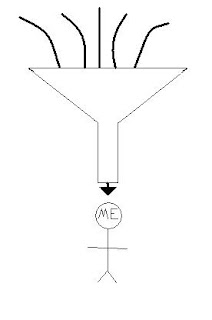After you have sufficiently read the news, you will undoubtedly be drawn to certain articles. Maybe, you even care enough to do more research on your own. Thus you would turn to a blog. Say you are following the political implications surrounding ACORN. Would you not wish to read from the site in which ACORN is a constant topic? Of course you would; it would be understandable that you would go to Big Government.
But how do all of these things relate to the “press sphere?” Well, when you start to realize that you are drawn to certain issues, certain articles of the day, then you begin to see that you are the controller of the “press sphere.” Whereas, in the past, the ecology of news in relation to you was more readily viewed as a funnel in which you get everything poured through the funnel for you,

now, you can decide what comes out of the funnel because you are engineering what is going into it. Have fun with that.